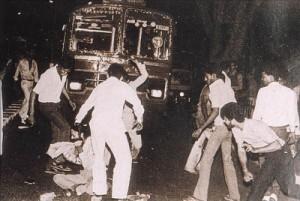
Sikh man being surrounded and attacked by mobs in 1984
During the 1930s and 1940s, Pandit Nehru, first Prime Minister of post-partition India learnt from bitter personal experience of the ease with which a repressive government can label someone an extremist and throw him into gaol. He was quick to learn the lesson from his British mentors and, within months of becoming Prime Minister in 1947, he in turn incarcerated the more prominent of his political opponents – including the veteran Sikh leader Master Tara Singh. The latter had dared to remind him of his promise to the Sikh people 12 months earlier, that he saw nothing wrong with an area being set aside in the north of free India “where Sikhs could also experience the glow of freedom.”
“The situation is different now,” was Pandit Nehru’s comment when reminded of this promise. The Sikh leader was branded “an extremist” and duly gaoled for demanding a measure of autonomy for Punjab that was in fact considerably less than that enjoyed by individual states in the US.
Mr Nehru’s daughter, Indira Gandhi, with all the cynicism and double-talk of dictatorial governments posing as democracies, has been quick to improve on both the language and methods of repression. First in the “emergency”, when all pretence of democracy was dropped, and, more recently, again under the guise of democracy, a cruel feline viciousness has been unleashed on the people of India.
The “emergency” saw the “disappearance” of hundreds of political opponents, the forced sterilisation of the poor, and the destruction of their hovels in the name of progress. In the last two years thousands of “terrorists” and “political agitators” have been shot in Kashmir, Assam and Maharashtra. Now it is the turn of Punjab and the Sikhs. The massacre in Amritsar of perhaps as many as 2,000 mostly unarmed and innocent Sikh men, women, and children – “terrorists” – easily outdoes in barbarity and outrage the 1919 shooting at Jallianwala Bagh where 379 people were killed by General Dyer.
The killings by General Dyer, were in an open park, the slaughter at the Golden Temple was in the holiest of holy Sikh shrines. Indira Gandhi’s justification was that it was a base for Sikh terrorists. Let us look at the facts. The one requirement for terrorism is secrecy. One would not advertise and plan terrorism from, say, the concourse of Waterloo Station. Similarly, the Golden Temple with its famous four doors to emphasise its welcome to pilgrims and visitors from all four corners of the globe, irrespective of race, religion or national origins, had, to say the least, serious limitations that would, religious considerations apart, have precluded its use by any group intent on serious terrorism.
A secret telephone number is a useful asset for organising terrorism. The phones into the Golden Temple were known to, and tapped by the police. Inside, right up to the time of the government attack, pilgrims and visitors, including the foreign press, were free to go into any part of the Temple complex. Outside, a heavy police presence had existed for more than a year around each entrance to the Golden Temple. It is true that, as government threats to enter and desecrate the Temple increased over the months, parallel attempts to build up defences to deter such a sacrilegious attack also increased. The “fortifying” of the Golden Temple was nothing but a response to increasing evidence that Mrs Gandhi was determined to solve the “Sikh question” by striking at the very heart of Sikhism.
Indira Gandhi is right when she says that terrorism must be rooted out. But who are the terrorists? Those perpetrating organised violence, or those that oppose it? It is not generally known outside Punjab that, over the past two years, thousands of Sikh homes in the Punjab villages have been raided by police and paramilitary forces. Young Sikhs have been dragged away for questioning, never to be seen again. The sight of murdered Sikhs floating in rivers and waterways has become a common occurrence. The current issue of the journal of Amnesty International cites several harrowing examples of police brutality and torture. More recently eyewitnesses’ accounts to the Amritsar massacre talk of women and children being shot in cold blood, and Sikh prisoners being tied with their own turbans and then shot in the head. Who then are the terrorists?
The myth of a “terrorist base” borrowed from the vocabulary of more subtle colonial powers, is not the only way in which Mrs Gandhi has allowed truth to be stood on its head. Lack of space forbids a more detailed analysis but the reader trying to find truth in Mrs Gandhi’s press releases might well find the following glossary helpful.
Sikh extremist: One who believes he should be allowed to practice his religion unmolested and that Sikhs and other Punjabis should not be treated less favourably than their brothers and sisters in other Indian states.
Sikh fundamentalist: a Sikh who believes in the fundamentals of the Sikh religion, namely belief in one God, earning by one’s own efforts, helping the less fortunate, religious tolerance, equality of women and universal human brotherhood.
Sikh fanatic: Alternative for Sikh fundamentalist. I. G. Factor: A “multiplier” of 10. Used by Indira Gandhi and Indian government watchers, and based on experience in Kashmir, Assam and elsewhere, to convert press release figures to something approaching reality. For example, the initial Indian government figure of 250 deaths in the Golden Temple converts to 2,500. Eyewitness reports fear that this may be an understatement.
Minimum use of force: “We went in with prayers on our lips” says an Indian General. It is now being reported that the Army was given instructions not to take any prisoners. The coldblooded slaughter of men, women and children.
No alternative: The use of any or all the following clichés to justify excessive use of force-discovery of stockpile of sophisticated weapons; arsenals; bomb factory; involvement of a foreign power, CIA, etc. In the interests of national security: In the interests of Indira Gandhi and family.
Democracy: The inalienable right of a majority to crush minorities. Rule by Indira Gandhi and family, for Indira Gandhi and family.
Indarjit Singh is the editor of the Sikh Messenger, and a member of the religious advisory committee of the United Nations Association.
Courtesy Guardian, first published, 18 June 1984
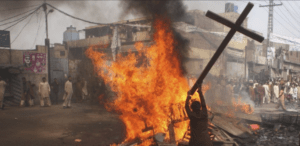 Last week our Director Lord Singh tabled a question to the government about Foreign and Commonwealth Office (FCO) support for persecuted Christians. He asked Her Majesty’s Government, ‘what assessment they have made of the recommendations of the Bishop of Truro’s Independent Review of the Foreign and Commonwealth Office’s support for persecuted Christians.’
Last week our Director Lord Singh tabled a question to the government about Foreign and Commonwealth Office (FCO) support for persecuted Christians. He asked Her Majesty’s Government, ‘what assessment they have made of the recommendations of the Bishop of Truro’s Independent Review of the Foreign and Commonwealth Office’s support for persecuted Christians.’

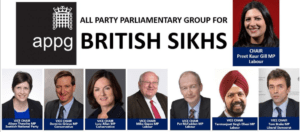



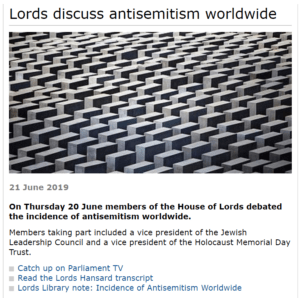 Our Director Lord Singh of Wimbledon contributed to a debate on anti-Semitism secured by Baroness Berridge in the House of Lords this week.
Our Director Lord Singh of Wimbledon contributed to a debate on anti-Semitism secured by Baroness Berridge in the House of Lords this week.
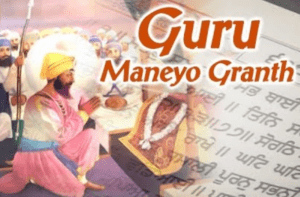 Guru Maneyo Granth—Guru Gobind Singh
Guru Maneyo Granth—Guru Gobind Singh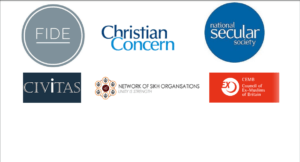
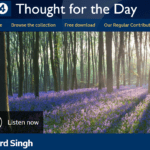 A Report commissioned by the Foreign Secretary Jeremy Hunt has found that the persecution of Christians in many parts of the world amounts to what some see as near genocide. Millions of Christians have been uprooted from their homes, and many have been killed, kidnapped, imprisoned and discriminated against.
A Report commissioned by the Foreign Secretary Jeremy Hunt has found that the persecution of Christians in many parts of the world amounts to what some see as near genocide. Millions of Christians have been uprooted from their homes, and many have been killed, kidnapped, imprisoned and discriminated against.